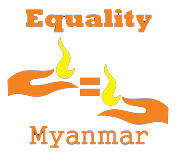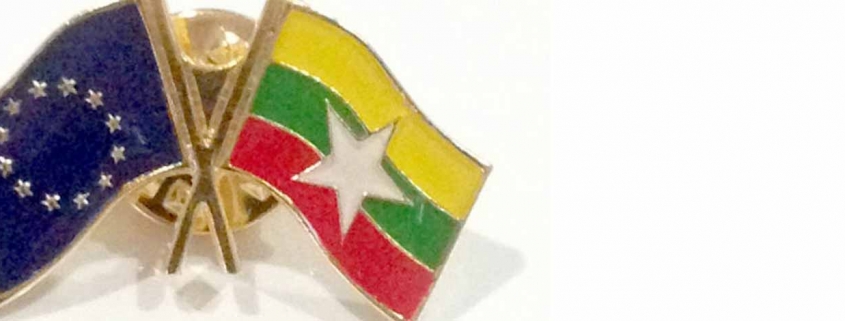Myanmar and the European Union hold their 4th Human Rights Dialogue
Nay Pyi Taw, 5 March 2018
Joint Press Release
1. The fourth Myanmar-EU Human Rights Dialogue was held in Nay Pyi Taw on 5 March 2018, co-chaired by Minister for International Cooperation U Kyaw Tin and EU Special Representative for Human Rights Stavros Lambrinidis.
2. Myanmar and the European Union reaffirmed their commitment to strengthen cooperation in the field of human rights on the basis of shared principles and international human rights standards.
3. Discussions covered a wide range of human rights issues relating to labour rights; the situation in Rakhine State; freedom of expression, the press, assembly and association; access to basic social services; gender issues; human trafficking and related exploitations; protection of the rights of persons belonging to minorities and combating and preventing religious intolerance and incitement to hatred; human rights cooperation in the United Nations, Myanmar’s accession to and implementation of international human rights conventions and treaties; and rights of refugees and migrants and national minorities in the EU.
4. Myanmar expressed appreciation to the EU for reaffirming its continued support towards the country’s democratic transition, peace and national reconciliation process and inclusive socio-economic development, and expressed the view that constructive engagement with Myanmar would contribute towards finding a sustainable solution for the situation in Rakhine State. The Government stated its commitment to promoting the rule of law, national security and human rights.
5. With regard to the situation in Rakhine State, Myanmar took note of the concerns expressed by the EU in the Council Conclusions of 26 February 2018. It provided an update on the activities carried out in particular by the “Union Enterprise for Humanitarian Assistance, Resettlement and Development in Rakhine“, and ongoing preparations for the return of displaced persons from Rakhine State in accordance with the bilateral arrangement of 23 November 2017, including its readiness to receive verified and voluntary returnees and measures towards creating conducive conditions for safety, law and order and the protection of all communities. Myanmar briefed on the progress made on the implementation of the recommendations of the Advisory Commission on Rakhine State. Myanmar informed about ongoing humanitarian activities to all affected communities through the Red Cross Movement, the World Food Programme, the Food and Agriculture Organisation and the ASEAN Coordinating Center for Humanitarian Assistance on Disaster Management (AHA Center). It informed that it has invited the United Nations High Commissioner for Refugees and the United Nations Development Programme to jointly assist Myanmar’s efforts in repatriation and resettlement of displaced persons as well as in providing for the livelihood and development for all communities in Rakhine State.
6. The EU explained the EU Council Conclusions of 26 February 2018, including its assessment of the nature of human rights violations in Rakhine State. It took positive note of initial steps towards the implementation of the recommendations of the Advisory Commission on Rakhine State and cooperation with the Government of Bangladesh in preparation for the repatriation of displaced persons from Rakhine State. It underlined the importance of addressing root causes of discrimination and future challenges to a voluntary, safe, and dignified return including through cooperation with the UNHCR. The EU also welcomed the intention expressed by the Government of Myanmar to undertake steps towards closing IDP camps in central Rakhine State and underlined the importance of an inclusive, transparent and consultative process in accordance with international standards.
7. The EU reiterated the importance of security, full humanitarian access and an independent and credible investigation into reported human rights violations, including cooperation with the UN Human Rights Council’s Fact-Finding Mission. The EU highlighted the importance of continued efforts on the part of the Myanmar authorities to provide full accountability for violations and to tackle the continuous climate of fear and insecurity in Rakhine State. The EU also underlined the need to promote reconciliation and dialogue between the communities and particularly emphasised the importance of a long-term political, security and socio-economic strategy for Rakhine State, including a concrete Action Plan in support of the recommendations of the Advisory Commission on Rakhine State, and reiterated its offer of support to the Government of Myanmar in this regard.
8. The Dialogue also enabled presentations on enhancing the protection and promotion of human rights, an exchange of best practices, and the identification of ways to strengthen cooperation in areas of mutual interest. The EU welcomed progress made by the Government of Myanmar on the promotion of labour rights and its continued close cooperation with the ILO in this regard.
9. The EU encouraged that existing and draft laws affecting freedom of expression and freedom of peaceful assembly and association be brought in line with international human rights standards.
10. Regarding the rights of national minorities, the EU side shared relevant policy and measures in EU Member States in addressing the challenges. Myanmar and the EU also provided updates on the legal framework for the protection of persons belonging to minorities and ongoing efforts to promote non-discrimination.
11. Myanmar briefed on the implementation of the National Strategic Plan for the Advancement of Women (2013-2022) and there was an exchange of views on how to best fight trafficking of women and girls.
12. Multilateral human rights issues were discussed with a view of the ongoing session of the UN Human Rights Council. The EU reiterated that access of and cooperation with all relevant UN mandate holders was essential and advocated for Myanmar to continue cooperation with the UN Special Rapporteur on Human Rights in Myanmar. The EU welcomed Myanmar’s recent ratification in October 2017 of the International Covenant on Economic, Social and Cultural Rights and encouraged Myanmar to actively consider ratifying additional international human rights conventions and the optional protocols thereto, notably the International Covenant for Civil and Political Rights. The two sides agreed to pursue further future cooperation in this regard.
13. The dialogue was attended by Senior Officials from different Myanmar government ministries and agencies and senior EU Officials including EU Ambassador to Myanmar, Mr. Kristian Schmidt, the Deputy Managing Director for the Asia-Pacific region of the European External Action Service, Ms Paola Pampaloni, and Ambassadors and other senior diplomats from several European Union Member States.
14. It was agreed to hold the next round of the dialogue in 2019 in Brussels.


 Equality Myanmar (EQMM) is a leading nongovernmental organization that organises a wide range of human rights education and advocacy programs, the documentation human rights violations, and provides emergency support for activists, human rights defenders, and their families. We work with a range of local civil society organizations, educators, activists, various local actors, and our programs and activities reach all states and regions in Myanmar.
Equality Myanmar (EQMM) is a leading nongovernmental organization that organises a wide range of human rights education and advocacy programs, the documentation human rights violations, and provides emergency support for activists, human rights defenders, and their families. We work with a range of local civil society organizations, educators, activists, various local actors, and our programs and activities reach all states and regions in Myanmar.
